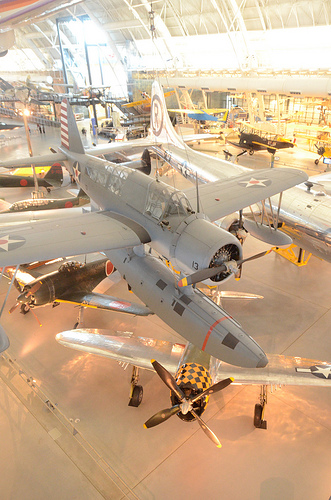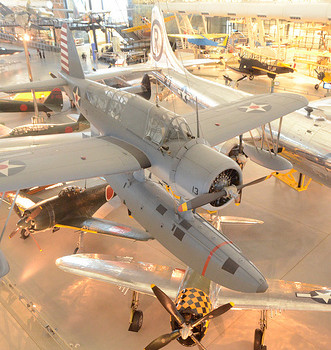Steven F. Udvar-Hazy Center: South hangar panorama, which includes Vought OS2U-3 Kingfisher seaplane & B-29 Enola Gay, among other individuals

Image by Chris Devers
Quoting Smithsonian National Air and Space Museum | Vought OS2U-three Kingfisher:
The Kingfisher was the U.S. Navy’s principal ship-based, scout and observation aircraft throughout Planet War II. Revolutionary spot welding techniques gave it a smooth, non-buckling fuselage structure. Deflector plate flaps that hung from the wing’s trailing edge and spoiler-augmented ailerons functioned like added flaps to let slower landing speeds. Most OS2Us operated in the Pacific, exactly where they rescued many downed airmen, like World War I ace Eddie Rickenbacker and the crew of his B-17 Flying Fortress.
In March 1942, this airplane was assigned to the battleship USS Indiana. It later underwent a six-month overhaul in California, returned to Pearl Harbor, and rejoined the Indiana in March 1944. Lt. j.g. Rollin M. Batten Jr. was awarded the Navy Cross for producing a daring rescue in this airplane beneath heavy enemy fire on July four, 1944.
Transferred from the United States Navy.
Manufacturer:
Vought-Sikorsky Aircraft Division
Date:
1937
Nation of Origin:
United States of America
Dimensions:
Overall: 15ft 1 1/8in. x 33ft 9 1/2in., 4122.6lb., 36ft 1 1/16in. (460 x 1030cm, 1870kg, 1100cm)
Materials:
Wings covered with fabric aft of the main spar
Physical Description:
Two-seat monoplane, deflector plate flaps hung from the trailing edge of the wing, ailerons drooped at low airspeeds to function like further flaps, spoilers.
• • • • •
Quoting Smithsonian National Air and Space Museum | Boeing B-29 Superfortress "Enola Gay":
Boeing’s B-29 Superfortress was the most sophisticated propeller-driven bomber of Globe War II and the 1st bomber to house its crew in pressurized compartments. Despite the fact that designed to fight in the European theater, the B-29 identified its niche on the other side of the globe. In the Pacific, B-29s delivered a variety of aerial weapons: conventional bombs, incendiary bombs, mines, and two nuclear weapons.
On August 6, 1945, this Martin-constructed B-29-45-MO dropped the 1st atomic weapon employed in combat on Hiroshima, Japan. Three days later, Bockscar (on display at the U.S. Air Force Museum near Dayton, Ohio) dropped a second atomic bomb on Nagasaki, Japan. Enola Gay flew as the advance weather reconnaissance aircraft that day. A third B-29, The Wonderful Artiste, flew as an observation aircraft on both missions.
Transferred from the United States Air Force.
Manufacturer:
Boeing Aircraft Co.
Martin Co., Omaha, Nebr.
Date:
1945
Nation of Origin:
United States of America
Dimensions:
All round: 900 x 3020cm, 32580kg, 4300cm (29ft six five/16in. x 99ft 1in., 71825.9lb., 141ft 15/16in.)
Components:
Polished overall aluminum finish
Physical Description:
4-engine heavy bomber with semi-monoqoque fuselage and higher-aspect ratio wings. Polished aluminum finish general, common late-Globe War II Army Air Forces insignia on wings and aft fuselage and serial number on vertical fin 509th Composite Group markings painted in black "Enola Gay" in black, block letters on reduced left nose.
Tsugami/Rem Sales Consigns First 7–Axis Swiss Turn Machine to Connecticut …
“The Tsugami Swiss screw machine diversifies our capabilities at the Advanced Manufacturing Center (AMC),” stated Don Balducci, AMC interim director. “The Tsugami is a 7-axis machine that is capable of simultaneous 5-axis machining to produce complicated …
Read far more on PR Web (press release)
Lean Hobbing Gears on a Multi-Axis Machine
Once the organization researched the pros and cons of dedicated hobbing gear versus multi-axis machine tools, it decided to obtain the NT1000 lathe and milling machine from DMG MORI. W.M. Berg was eager to utilize this technologies … “This machine is …
Study a lot more on Contemporary Machine Shop
Open-supply “MMO for makers” aims to crowdsource manufacturing design
Opening day at the DMDII Manufacturing Lab, exactly where designs from the Digital Manufacturing Commons can be "printed" for the duration of trials to physical prototypes. The lab's complex machine cell, with gear supplied by DMG MORI, contains multi-axis milling …
Read far more on Ars Technica (blog)
